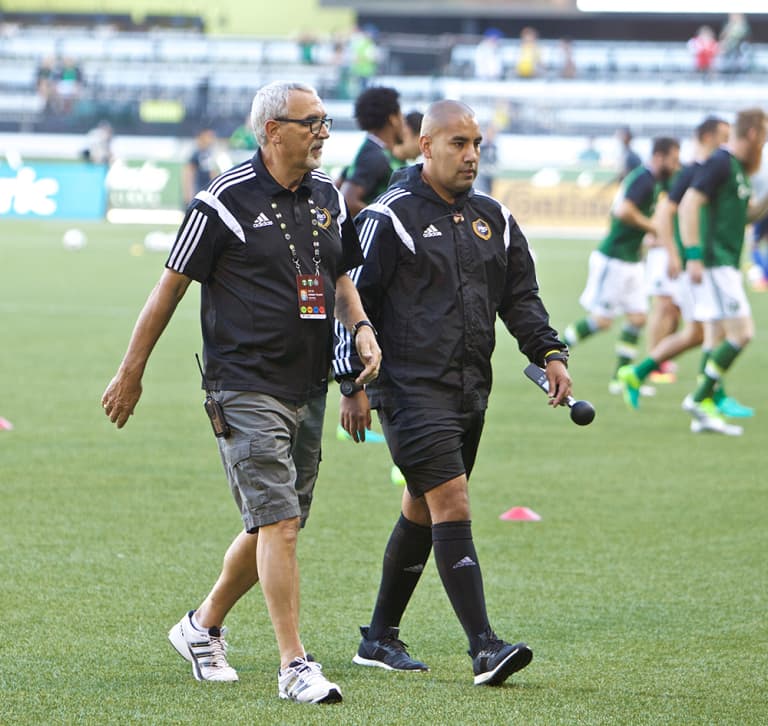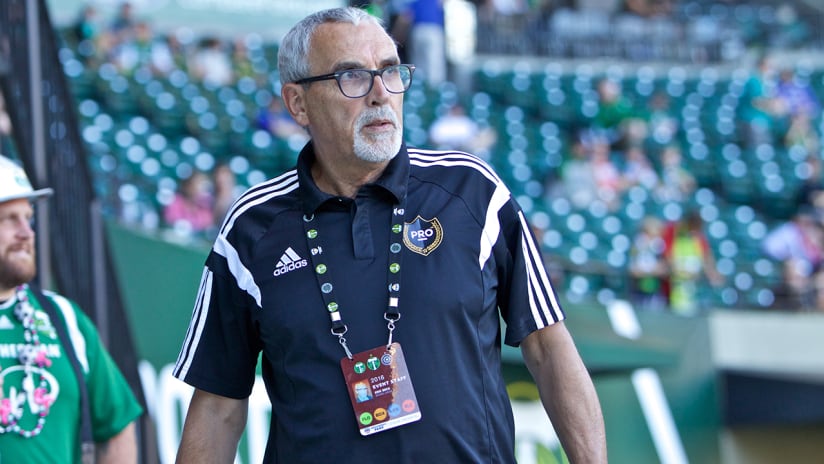PORTLAND, Ore. – In the locker room, the men sit together in silence as a complex array of emotions plays across their faces. One stares at the floor and nervously taps his foot, while another looks straight ahead, his face displaying some combination of concern and excitement.
Eric Beck suddenly interrupts their reverie with an announcement: it's time they made their way to the team tunnel.
It's game time.
Before they leave, the men quickly huddle up. The most senior of them gives a short pep talk, after which one of the men, suddenly overcome with adrenaline, shouts “Let's go!” and claps his hands as he makes his way out of the locker room and into the corridor beyond.
It's a familiar scene; one the plays out in professional locker rooms before soccer matches all across the world. Only in this scene, the actors aren't players; they're referees. And Beck, the man who ushered the officials out of the locker room before the game, has the unique responsibility of making sure that scenes like this one play out as seamlessly as this before every Portland Timbers match.
- Sideline View: The excitement of singing the national anthem
- Sideline View: How a game photographer captures the action
A former referee himself, Beck understands what it takes to officiate a high-level soccer match and because of this, he makes it his job to ensure that match days unfold as smoothly as possible for the referees.
The Nottingham, England native – who may be more famous for penning the Timbers NASL-era anthem “Green Is the Color” than he is for his work as a referee liaison – lists among his many tasks chauffeuring the referees to and from the stadium, ensuring that all the match balls are properly inflated, and carrying equipment out to the fourth official.
“That's why I'm glad I can contribute by helping these guys, even in the job I do right now,” he says. “It's nothing compared to what they do in the game, but it helps...reassure these guys.”
Since 2011, Beck has been helping referees at hundreds of Timbers and Portland Thorns FC matches focus on their jobs instead of on the travel and incidentals – examples of which include fixing a fraying badge, leaving tickets at will call, or finding batteries for a headset – that can so easily distract them from the enormous task ahead of them.
“Things go wrong,” Beck explains matter-of-factly. “One of [the officials] has got a tight hamstring or something, so I go get the roller for him and make sure they're all taken care of...Sometimes you're running like crazy and sometimes all the equipment's there...The balls have been checked, the flow is going, nothing is going wrong, and it looks like I'm walking around doing nothing all the time. But it changes.”

Photo: Craig Mitchelldyer
Yet as Beck himself points out, if everything seems to be running smoothly, it's only because he's been doing his job.
Beck's own career as a referee began in 1978, four years after he first left his home in England and moved to Portland. He credits then-Timbers general manager Peter Warner – who was himself a part-time referee – for first talking him into donning a referee's uniform.
Three years after he first became a USSF referee, Beck became a USSF State Referee and, in 1993, a USSF National Referee. By the time he retired as a national referee in 1997, Beck had officiated thousands of matches, a distinction that earned him a place in the U.S. Adult Soccer Association (USASA) National Soccer Hall of Fame in 2010 and a Region IV Lifetime Achievement Award this year.
It's because of this deep well of experience and knowledge that Beck has earned the trust of the referees with whom he works at each Timbers and Thorns home match. They know that he understands the difficulties and complexities of their job in a way that few others do.
“From the outside looking in, [officiating] looks easy,” he says. “But when you get on the field and you have to deal with the personalities of the different players and man management and all that stuff it becomes a real big issue. Some people – a lot of players who become referees – can't adapt to changing over to refereeing after playing.”
Among the referees, there's a noticeable respect for Beck. At a recent match, one of the referees even referred to him as “sir.” When Beck speaks, the other referees listen.
After a match once, a referee said to him: “When my career's over, I think I'll do what you're doing.”
For Beck, who became a referee liaison so he could give back to a game that he says gave so much to him, few compliments could be sweeter.








!["We're looking forward to that extra quality that Jonathan [Rodríguez] brings" | Phil Neville on the squad at SKC](https://images.mlssoccer.com/image/private/t_editorial_landscape_8_desktop_mobile/f_auto/mls-por/kvnkh6dod1dezh0mghvp)



